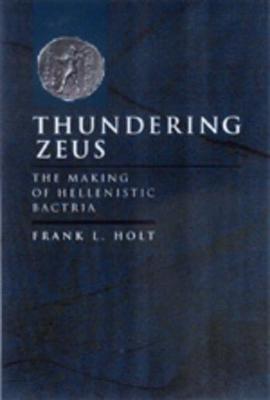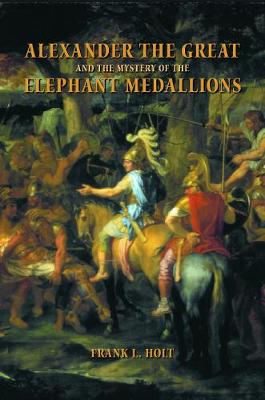Hellenistic Culture and Society
4 primary works
Book 32
"Thundering Zeus" uses an innovative, interdisciplinary approach to resolve one of the greatest puzzles in all of Hellenistic history. This book explores the remarkable rise of a Greek-ruled kingdom in ancient Bactria (modern Afghanistan) during the third century B.C. Diodotus I and II, whose dynasty emblazoned its coins with the dynamic image of Thundering Zeus, led this historic movement by breaking free of the Seleucid Empire and building a strong independent state in Central Asia. The chronology and crises that defined their reigns have been established here for the first time, and Frank Holt sets this new history into the larger context of Hellenistic studies. The best sources for understanding Hellenistic Bactria are archaeological, and they include a magnificent trove of coins. In addition to giving a history of Bactria, "Thundering Zeus" provides a catalog of these coins, as well as an introduction to the study of numismatics itself. Holt presents this fascinating material with the precision and acuity of a specialist and with the delight of an admirer, providing an up-to-date full catalog of known Diodotid coinage, and illustrating twenty-three coins.
This succinct, energetic narrative thunders across the history of Hellenistic Bactria, exhuming coins, kingdoms, and customs as it goes. The result is a book that is both a history and a history of discovery, with much to offer those interested in ancient texts, archaeology, and coins.
This succinct, energetic narrative thunders across the history of Hellenistic Bactria, exhuming coins, kingdoms, and customs as it goes. The result is a book that is both a history and a history of discovery, with much to offer those interested in ancient texts, archaeology, and coins.
Book 44
Alexander the Great and the Mystery of the Elephant Medallions
by Frank L. Holt
Published 24 November 2003
To all those who witnessed his extraordinary conquests, from Albania to India, Alexander the Great appeared invincible. How Alexander himself promoted this appearance - how he abetted the belief that he enjoyed divine favor and commanded even the forces of nature against his enemies - is the subject of Frank L. Holt's absorbing book. Solid evidence for the "supernaturalized" Alexander lies in a rare series of medallions that depict the triumphant young king at war against the elephants, archers, and chariots of Rajah Porus of India at the Battle of the Hydaspes River. Recovered from Afghanistan and Iraq in sensational and sometimes perilous circumstances, these ancient artifacts have long animated the modern historical debate about Alexander. Holt's book, the first devoted to the mystery of these ancient medallions, takes us into the history of their discovery and interpretation, into the knowable facts of their manufacture and meaning, and, ultimately, into the king's own psyche and his frightening theology of war. The result is a valuable analysis of Alexander history and myth, a vivid account of numismatics, and a spellbinding look into the age-old mechanics of megalomania.
Book 47
What George W. Bush called the 'first war of the twenty-first century' actually began more than 2,300 years ago when Alexander the Great led his army into what is now a sprawling ruin in northern Afghanistan. Accounts of Alexander's invasion of ancient Bactria read eerily like news from our own day. In this vivid, meticulously researched, and elegantly narrated book, Frank L. Holt follows Alexander's historical, archaeological, and numismatic legacy back and forth between ancient Bactria and modern Afghanistan. Recounting the plight of the most powerful leader of the time as he led the most sophisticated army of its day into the treacherous world of tribal warlords, Holt describes those grueling campaigns and the impact they had on Alexander, his generals, their troops, and the world. "Into the Land of Bones" also examines the conflict from the point of view of the local warlords who pushed the invading Greeks to the limits of their endurance - and sometimes beyond, into mania and mutiny. The lively narrative situates the current war in Afghanistan in a broader historical perspective.
Holt explains how the three modern superpowers that have invaded Afghanistan - Britain in the nineteenth century, the Soviets in the twentieth, and the United States in the twenty-first - are continuing the struggle that Alexander began centuries ago. That this legacy continues to play itself out today is a testament to the timeliness of Holt's fascinating and original account.
Holt explains how the three modern superpowers that have invaded Afghanistan - Britain in the nineteenth century, the Soviets in the twentieth, and the United States in the twenty-first - are continuing the struggle that Alexander began centuries ago. That this legacy continues to play itself out today is a testament to the timeliness of Holt's fascinating and original account.
Book 53
Drawing on ancient historical writings, the vast array of information gleaned in recent years from the study of Hellenistic coins, and startling archaeological evidence newly unearthed in Afghanistan, Frank L. Holt sets out to rediscover the ancient civilization of Bactria. In a gripping narrative informed by the author's deep knowledge of his subject, this book covers two centuries of Bactria's history, from its colonization by remnants of Alexander the Greats army to the kingdom's collapse at the time of a devastating series of nomadic invasions. Beginning with the few tantalizing traces left behind when the 'empire of a thousand cities' vanished, Holt takes up that trail and follows the remarkable and sometimes perilous journey of rediscovery. Lost World of the Ancient King describes how a single bit of evidence - a Greek coin - launched a search that drew explorers to the region occupied by the tumultuous warring tribes of eighteenth- and nineteenth-century Afghanistan. Coin by coin, king by king, the history of Bactria was reconstructed using the emerging methodologies of numismatics. In the twentieth century, extraordinary ancient texts added to the evidence.
Finally, one of the 'thousand cities' was discovered and excavated, revealing an opulent palace, treasury, temple, and other buildings. Though these great discoveries soon fell victim to the Afghan political crisis that continues today, this book provides a thrilling chronicle of the search for one of the world's most enigmatic empires.
Finally, one of the 'thousand cities' was discovered and excavated, revealing an opulent palace, treasury, temple, and other buildings. Though these great discoveries soon fell victim to the Afghan political crisis that continues today, this book provides a thrilling chronicle of the search for one of the world's most enigmatic empires.


